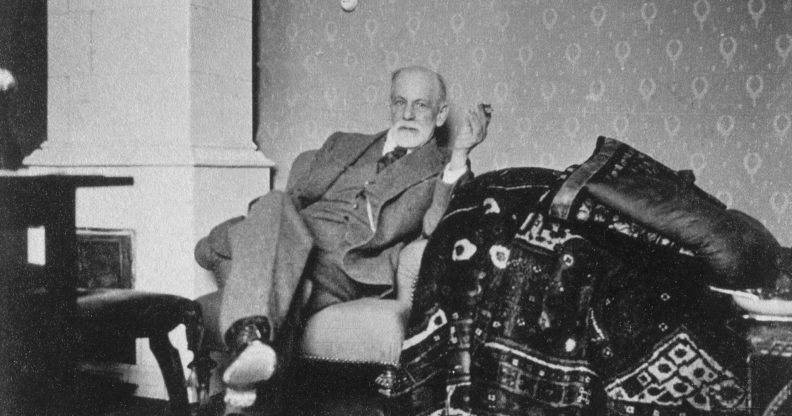Conversion therapy is so indefensible that even Sigmund Freud thought it was utter nonsense

There has never been any evidence to support conversion therapy, with even Freud insisting that being gay was not a disease. (Getty/ Imagno)
A queer historian has explained that the practice of conversion therapy has always been so indefensible that even the early psychotherapist Sigmund Freud was an “ally”.
Queer historian Sacha Coward told the BBC Radio 4 documentary Faith, Lies and Conversion Therapy that conversion therapy only became common practice around the 1930s.
He said: “Homosexuality, non-heteronormativity, non-cisgender people have been discriminated against pretty much since forever.
“The origins of conversion therapy, the idea that you can sit down and through a process transform someone’s gender or sexual identity to the ‘accepted’ one, comes about most prominently around the 1930s. This is when you get this psychodynamic approach.”
Today, it is obvious to most people that conversion therapy is not effective in changing a person’s gender identity or sexual orientation. But Coward explained that even in the early days of conversion therapy and throughout its history, the practice has always been viewed as unscientific, even by “famous psychotherapists like Freud”.
Although Freud’s psychotherapy practice and personal life were awful and disturbing in many ways, when it came to conversion therapy he was a “staunch ally”, said Coward.
“There’s an example of Freud receiving a letter from a worried mother, talking about her son who she worries is gay. He writes back, and actually in some ways he’s quite a staunch ally.
“He says that being gay is not a disease, it isn’t a disorder, it’s not something you can necessarily treat.”
However, Freud did question whether being gay could be a result of “unresolved anxiety”, and so many other mental health professionals “latched onto this”, Coward said.
He continued: “They start to believe that through the psychodynamic approach, the so-called ‘talking cure’, you could change a gay man into a straight man, or a bisexual woman into a straight woman.”
Homosexuality was declared a mental illness, without any evidence, in 1952 by the American Psychological Association (APA), after Freud’s letter was published.
Coward said: “It was different. And just because it was different, it had to be wrong, and therefore it had to be an illness.”
But in 1957, a report was published by American psychologist Dr Evelyn Hooker, proving that LGBT+ people did not actually show any signs of mental illness just because they were LGBT+.
“She kind of proved that the whole idea of putting homosexuality as a mental disorder was wrong, because there was no disorder,” said Coward.
“If you are not unwell, then you don’t need to be treated.” The release of Hooker’s report was “pretty much repressed” until 1970, he said, which meant 14 years of increasingly invasive conversion therapy methods, like lobotomies, chemical castration, aversion therapy and electroconvulsive therapy (ECT).
Still, there was no evidence that any of these so-called “treatments” were effective.
Dr Qazi Rahman, who studies the “biological basis of sexual orientation”, also spoke with the BBC 4 documentary, explaining that while even in Freud’s time there was no evidence for conversion therapy, we now have even more proof that “curing” someone’s sexual orientation or gender identity is impossible.
Rahman said: “Sexual orientation is a pattern of desire, not a pattern of behaviour or of sexual acts per se… That pattern of desire cannot be changed by simple will, or acting in a particular way.
“Behaviour can, absolutely. You can choose your sexual partners, you can choose to be married, but to change one’s actual pattern of sexual desires is not possible.”
What we do have is evidence of how harmful it is, yet still no ban on the practice in the UK.
More than two and half years since the Tories pledged in 2018 to “eradicate” the abhorrent practice in the UK as part of their LGBT+ Action Plan, very little measurable progress has been made.
On Monday (8 March) Kemi Badenoch gave a speech at a parliament debate on conversion therapy, and was slammed her “extremely troubling” comments, giving no timeline, mentioning no specifics relating to potential legislation and repeatedly refusing to use the word “ban”.
Since then, three members of the government’s LGBT+ Advisory Panel have quit their positions over government inaction on conversion therapy and “hostility” towards the LGBT+ community.

